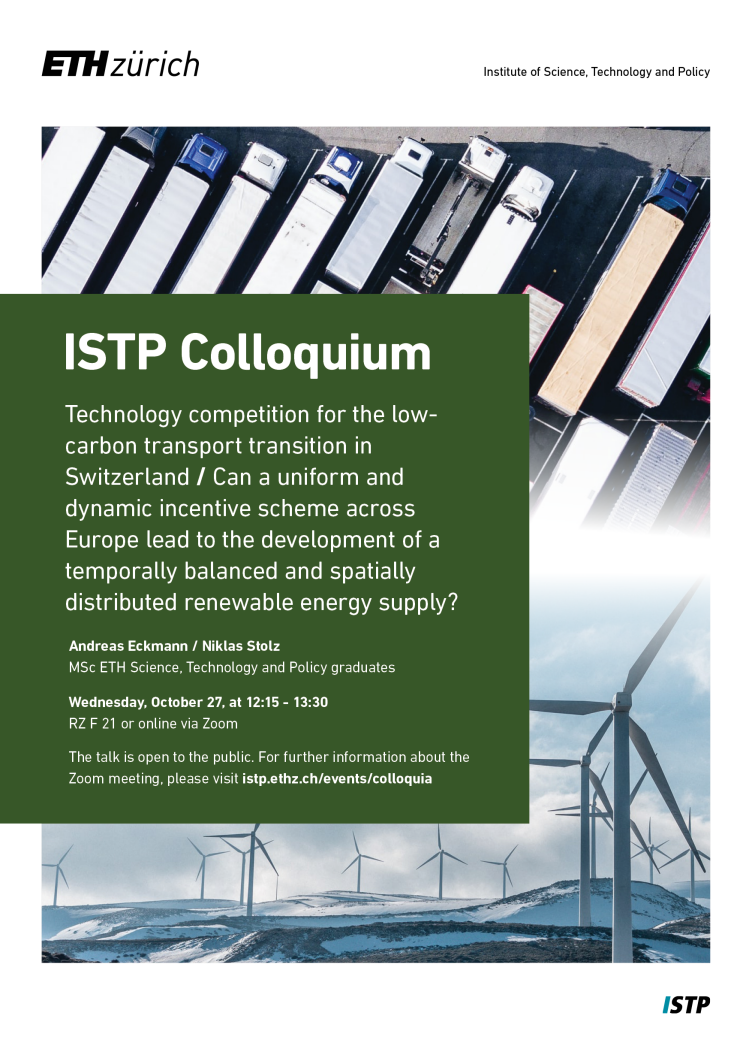Colloquium: Andreas Eckmann and Niklas Stolz
Wednesday, Oct 27, 2021, at 12.15 - 13.30
Room RZ F 21 or Online, Zoom | Sign up here
Download Click to add the event to your calendar (ICS, 2 KB)
Andreas Eckmann: Technology competition for the low-carbon transport transition in Switzerland
The transition to low-carbon pathways to reach the goals of the Paris Agreement is an often discussed topic. However, it is still unclear how economically feasible low-carbon drive-technologies are as a solution to decarbonizing the road-freight sector. Policy-makers strive to intervene in such a transition at minimal financial cost.
This work specifically aims to identify and understand the drivers behind market share competition between commercial vehicle drive-technologies in Switzerland. These objectives are addressed by projecting the road-freight transport transition in Switzerland based on an accurate representation of the road-freight landscape. To this end, a modeling framework is presented that builds on an existing dynamics model and enriches it with very detailed transport data, additional parameters and customized Swiss-specific input parameters. To gain a better understanding of the Swiss transport sector and its country-specific patterns, a detailed analysis of national transport performance is performed. The model is further validated with industry feedback obtained by expert interviews.
Overall, we find a strong dominance of battery electric trucks (BETs) in Switzerland’s road-freight future. Fuel cell electric trucks (FCETs) are only able to gain a cost advantage if the costs of hydrogen decrease significantly over the next years. For the case of light-duty 3.5 tonne vehicles, drive-technology cost reductions of zero-emission vehicles (ZEVs) alone are unlikely to result in a thorough decarbonization of the segment. A sensitivity analysis of the model input parameters confirms detailed insights gained from a literature review and expert interviews. Lastly, a proposed policy-mix lays a foundation for discussion and indicates areas in which political intervention is imperative in achieving the agreed-upon climate targets for the Swiss transport sector.
Download the Download thesis (PDF, 8.7 MB) and the Download slides of the talk (PDF, 1.7 MB).
About Andreas Eckmann
Andreas Eckmann has graduated in the MSc STP programme with a minor in Energy & Mobility in April 2021 after he joined the Energy Politics Group (EPG) in 2020 to conduct his master’s thesis in the field of freight transport. In his work, he focused on the future of road freight transport in Switzerland and how potential policy-mixes could foster a transition in the transport sector.
Andreas holds a Bachelor in Mechanical Engineering from ETH Zurich. Prior to his degree, he worked as a truck mechanic in Switzerland and Canada. While seeking political discussions when facing socio-technical challenges, Andreas became interested in analyzing the correlations beyond the technology itself. Since his graduation, and already during his studies, Andreas has worked as an account manager at external page Fischer Fuel Cell Compressor AG, which produces electric turbo compressors for the air supply of fuel cells.
Niklas Stolz: Can a uniform and dynamic incentive scheme across Europe lead to the development of a temporally balanced and spatially distributed renewable energy supply?
Reaching the European Union's net-zero emissions goals in 2050 will require massive greenhouse gas emission reductions in the power sector. Therefore, fossil fuel power plants need to be replaced with emission-free generation assets. That will likely lead to high shares of variable renewable energy (VRE) sources in the electricity system. Since VRE generators are dependent on resource availability from wind or solar irradiation, balancing electricity demand and supply at all times will become a challenge. While the fluctuation of VRE generation could be decreased by distributing VRE generation assets across Europe, currently, there is a concentration of VRE electricity generators in areas with high resource availability. That makes the electricity system vulnerable to local weather conditions.
This thesis develops and tests an incentive scheme that rewards the system-friendly allocation of VRE generators and penalizes the addition of system-unfriendly generators. The magnitude of the premium or penalty payments for a VRE generator in a specific location is determined by a system-friendliness score. The goal is to make system-friendly VRE locations cost-competitive with system-unfriendly locations where capacity factors might be higher. We will evaluate the incentive scheme's performance by comparing the resulting electricity system to the cost-optimal baseline system that developed without incentives.
Compared to the baseline, the developed incentive scheme substantially increases the energy system's resilience to weather variation during six years of simulated operation. While there were 257 events with unmet demand larger than 100MWh during a 4-hour time step in the baseline system, there were only 45 in the electricity system with incentives. Further, the requirement for backup capacity decreased by a factor of 3.8 between the system with incentives and the baseline system. The proposed incentive scheme improves the system performance across almost all weather regimes and increases the system costs by only 3.8\% compared to the cost-optimal case. The results of this work suggest that a coordinated and spatially explicit European VRE deployment policy will be beneficial to the future European electricity grid's stability.
Download the protected page slides of the talk (accessible for ETH members only)
About Niklas Stolz
Niklas Stolz is currently enrolled in the MSc STP programme with a minor in Energy & Mobility. He joined the Climate Policy Group in April 2021 to work on his master's thesis in the field of European energy policy. In his work, he focused on the potential benefits of a coordinated European renewable energy deployment policy.
Niklas holds a Bachelor in Mechanical Engineering from ETH Zurich. After finishing his Bachelor degree, he joined NÜWIEL as Control Systems Engineer to help developing an electric cargo bike trailer. Seeing all the exciting alternatives to conventional last-mile logistics, Niklas became interested in policy support for emerging technologies. After his graduation in November, Niklas will search for a new adventure inside or outside academia.
